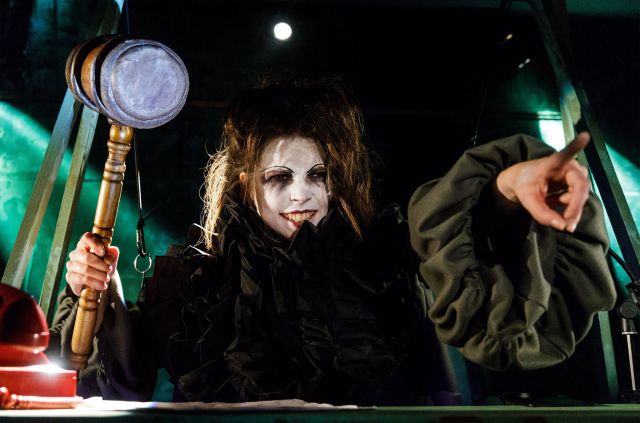You say you want a revolution? Good luck locating one amid the tonally muddled Inside Pussy Riot. The immersive production from Les Enfants Terribles takes audiences on a promenade-style journey through the terrifyingly true story of Nadya Tolokonnikova, the Russian activist who (along with bandmate Maria Alyokhina) was sentenced to two years in a Siberian prison in 2012 after performing 40 seconds of an anti-Putin protest song in a Moscow church. The setting for the piece is the Saatchi Gallery in affluent Chelsea and a stone's throw from not a few Russian oligarchs: ah, the irony of geography!
The location allows the audience to travel through a series of rooms representing various stages of Tolokonnikova's ordeal, from the initial protest itself as staged in a Day-Glo cathedral packed with gleaming stained glass Trumps, Putins and Murdochs through to solitary confinement in a darkened cell. The all-female ensemble bring Berkoff-style grotesquerie (pictured below) to the deliberately exaggerated portraits of police officers, prison wardens and the like. The performance style is one of large gestures, stylised poses and declamatory speeches. Zoe Koperski's design keeps pace, blending bright pastels with nightmarish pantomime scenarios to create a garish world that matches the prevailing hyperactivity. The confident direction is by Christa Harris, while Tolokonnikova shares a co-writing credit with Oliver Lansley. But whereas Tolokonnikova's imprisonment highlighted the oppression inherent in Putin's Russia (and catapulted Pussy Riot into the global consciousness), the seriousness of the topic here sometimes slips from view. Early on, an audience member is pressured to undress, challenging notions of culpability and solidarity, but to what end? (Discretion forbids me from saying more about the "reveal", so to speak, of this particular segment.) The audience, handed balaclavas at the start, are constantly reminded that they are in an interactive performance even as they are mocked for following instructions. After a while, one loses sight of who or what is being sent up. The Russian state? A public that would partake of such an event in one of London's most moneyed boroughs? Meta-theatre itself?
But whereas Tolokonnikova's imprisonment highlighted the oppression inherent in Putin's Russia (and catapulted Pussy Riot into the global consciousness), the seriousness of the topic here sometimes slips from view. Early on, an audience member is pressured to undress, challenging notions of culpability and solidarity, but to what end? (Discretion forbids me from saying more about the "reveal", so to speak, of this particular segment.) The audience, handed balaclavas at the start, are constantly reminded that they are in an interactive performance even as they are mocked for following instructions. After a while, one loses sight of who or what is being sent up. The Russian state? A public that would partake of such an event in one of London's most moneyed boroughs? Meta-theatre itself?
A later scenario finds Tolokonnikova's emotive diary entries read aloud, only to be drowned out by a second performer bellowing orders at the crowd. Not for the first time the over-egged style obscures the subject matter: there's an urgent message here that, unlike Tolokonnikova herself, never quite breaks free.













Add comment